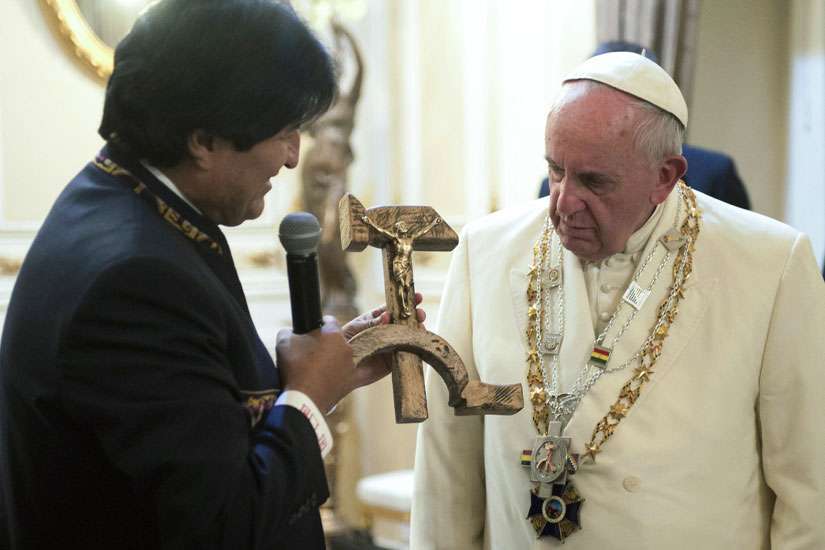The Pope met with president Evo Morales at Bolivia's Palace of Government on July 8. During the customary exchange of gifts, Pope Francis gave Morales a mosaic of a Marian icon.
Morales then handed his gift to the Pope and explained what what it represented. In the video, filmed by the Vatican Television Center and transmitted throughout the world, the Pope's disapproval of the gift can be seen, and he says “No está bien eso” — “This is not ok” — while shaking his head.
While the audio is a bit marred by the clicking of journalists' cameras, the embarrassment of the Pope seems clear.
The cross with a hammer and sickle is a reproduction of another carved during the 1970s by Fr. Luis Espinal Camps, a Spanish Jesuit missionary killed in 1980 during the Bolivian dictatorship.
At a July 9 press briefing the Holy See press officer, Fr. Federico Lombardi, noted the lack of clarity in the audio of the exchange, and remarked that Pope Francis had been unaware the crucifix was a replica of Espinal's. He also said that Espinal's use of it was not ideological but expressed a hope for dialogue between communism and the Church, adding that Pope Francis' remark likely expressed a sentiment of “I didn't know”, rather than “this is not right.”
Morales' gift has sparked a worldwide controversy, with the majority of critics accusing Morales of trying to politicize the Pope's visit.
Morales is head of Bolivia's Movement for Socialism party, and his administration has focused on implementing leftist policies in the nation. Since coming to power in 2006, Morales has frequently sparred with the Bolivian bishops.
Catholics from various Hispanophone countries rejected Morales' gesture, considering it offensive to the numerous victims of terrorist groups in Latin America and of the historical totalitarian communist regimes.
Bishop Jose Munilla Aguirre of San Sebastián, a Spaniard, tweeted: “The height of arrogance is to manipulate God in the service of atheistic ideologies … Today, once again: #ChristCrucified”.
Espinal, whose “communist crucifix” was the model for Morales' gift to the Pope, was a journalist who advocated for human rights and democracy. He continues to be a source of controversy in Bolivia.
While en route from the La Paz airport to the presidential palace, Pope Francis stopped to pray at the location where Espinal's corpse was found after his March 21, 1980 kidnapping and murder.
“Dear sisters and brothers. I stopped here to greet you and above all to remember. To remember a brother, our brother, a victim of interests who did not want him to fight for the freedom of Bolivia,” the Pope said to those gathered at the site.
“May Christ draw this man into himself. Lord give him eternal rest and may light shine for him that has no end.”
Some regard Espinal as a martyr who lived the Gospel with the same spirit as Blessed Oscar Romero — who was martyred by right wing Salvadorans two days after Fr. Espinal's death — while others claim the priest was a communist and became too involved in politics.
As a result of his work, the priest was kidnapped by a group of paramilitaries March 21, 1980, while on his way home.
According to police and militants at the time, the militants took Espinola to La Paz' Achachicala slaughterhouse, where he was tortured for five hours before being shot 17 times. His body was found handcuffed and gagged the next morning.


